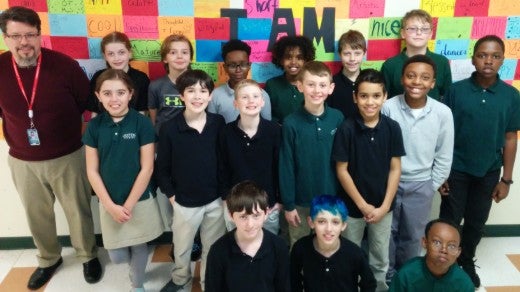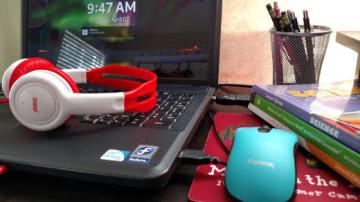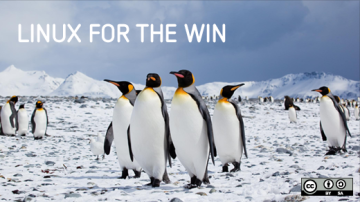This article is co-written by Cam Citrowske, a member of the Penguin Corps.
It was March 17, 2020, and I was in my classroom at Aspen Academy. The clock was ticking. This was to be the last day of school before we, along with every other public school in Minnesota, would close due to the outbreak of the new coronavirus. I had students in my room during lunch, advisory periods, and my elective classes all doing the same thing—installing Linux onto old computers so we could give them to students who would use them for school at home during the shelter in place order. I was only going to have the kids' help until dismissal time, but in the end, we had 17 computers ready to go. It was a start.
Hi, I'm Stu Keroff. I'm a social studies and technology teacher at Aspen Academy in Savage, MN. I am also the director of the Penguin Corps, our school's Linux club. When we started the club back in September of 2019, I wanted the kids at my new school to take on the same type of mission that the kids at my last school had: using Linux to close the "digital divide" (see this article about the Community School of Excellence Asian Penguins for more information). The Penguin Corps gave away a few computers during the year, but nothing had prepared us for what was coming.
It was in January that I first heard about COVID-19. At the time, it was making people sick in other countries, and while it was a topic of discussion in my social studies classes, I wasn't concerned because it wasn't in Minnesota.

(Stu Keroff, CC BY-SA 4.0)
By March, that had changed. Businesses were talking about how they would respond to the pandemic, and it raised the conversation about how it would affect schools. Fast forward to March 18, when all the schools in Minnesota were closed and converted to distance learning—teachers provide lessons online, and kids attend school in their homes over the internet. It was a huge change for all of us!
While it was tough for many of my students to go to school from their bedrooms or dining rooms, at least most of them had computers to use. But what about the kids at school who didn't have computers? Or the families who didn't have enough computers for all of the kids in the house? What were they supposed to do?
Our school's administrators reached out to me and the Penguin Corps to create a solution. We surveyed parents to find out how many families needed a computer and then got to work. We started by putting Linux on computers the school was no longer using, and then we gave those away. More responses started to pour in. We realized that the supply we had would not even be close to enough. This became a serious problem that was in need of a bigger solution.
Once we realized that, we started to ask for more. With help from the school, we reached out over social media and in the local newspaper, asking people to donate their old computers to us. A number of people and even some businesses like Caribou Coffee and St. Vincent de Paul of the Twin Cities responded. Laptops started to pour in. Most of them worked, but some needed minor repairs, such as new batteries, a charger, or a hard drive. All of the computers needed new software. Linux and open source apps were the solution. We got the computers up and running, tested them, and left them with the school to distribute.
The school continued to take referrals, and people came in to pick up laptops. The office receptionist eventually joined our team, walking parents through the software before they left with their laptops. Even though she had no previous experience with Linux, she was able to jump right in and contribute.
Prior to the shutdown, the Penguin Corps gave away six computers. Between March 16 and the first week of May, we gave away 60 computers. This effectively closed our school's digital divide.
And at what cost? Since we chose to go with used computers instead of buying new ones, the only thing we had to pay for were batteries, chargers, a couple of hard drives, and a keyboard. Total cost: approximately $900.00, or an average of $12.33 per computer, including the computers we had left over, which we're saving for the fall term.
The program even gave us the opportunity to help people outside of our school. Reverend Tim Christopher, a pastor in North Minneapolis, reached out to me and the Penguin Corps to ask for our help. A single mother in Minneapolis with two school-aged children needed computers for her kids to do distance learning from their home. Thanks to the Penguin Corps, both kids got one to use for school, for free.
Aspen Academy principal Melanie Jiskra said, "It was through this group of change agents that all Aspen Academy families had enough devices to continue their education through distance learning. Without the generosity of the people and companies who donated the laptops, the hard work and commitment of Mr. Keroff, and the talent, drive, and passion of the students to serve others, Aspen Academy would not have as successfully bridged the digital divide during this pandemic."
COVID-19 presented all schools with a challenge, and Aspen Academy's Penguin Corps demonstrated that open source software could be used to meet it. Our biggest challenge became our biggest victory.
Do you want to know more about how a Linux club can help your school or a school near you? You can email me at studoeslinux@gmail.com. You can also get ideas for starting your own program at www.linuxclubguide.com.












4 Comments